NEWS of the WEEK
Page 20
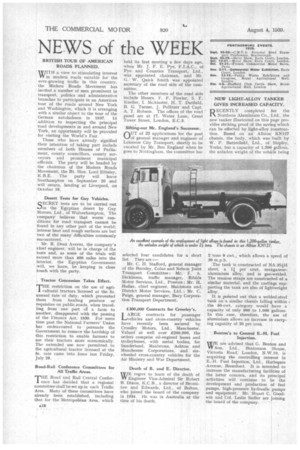
Page 21
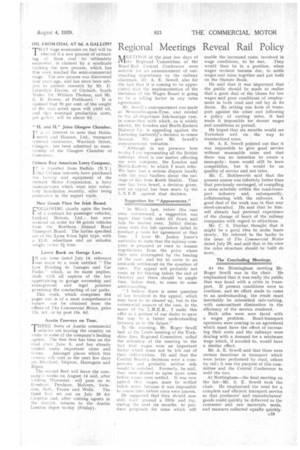
Page 22
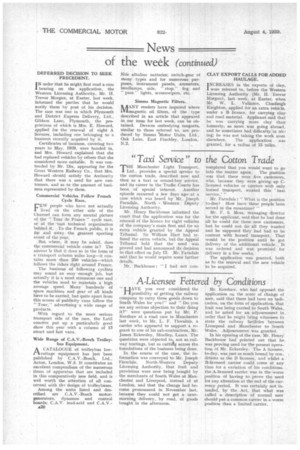
Page 23
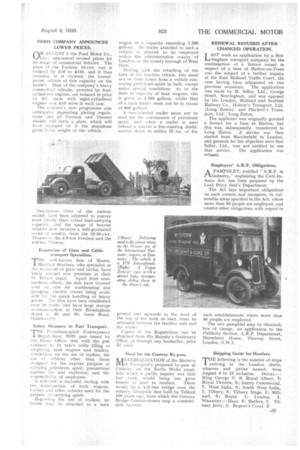
Page 24
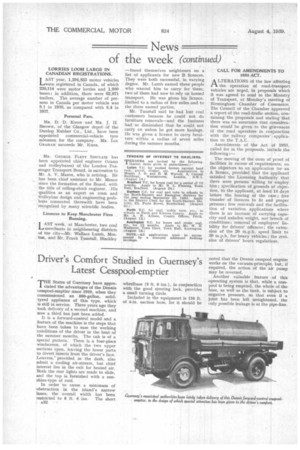
If you've noticed an error in this article please click here to report it so we can fix it.
BRITISH TOUR OF AMERICAN ROADS PLANNED.
WITH a view to stimulating interest VV in modern roads suitable for the ever-growing traffic in this country, the Modern Roads Movement has invited a number of men prominent in transport, politics and administrative branches to participate in an American tour of the roads around New York and Washington, which it is arranging with a similar object to the tour of the German autobahnen in 1937. In addition to inspecting the principal -road developments in and around New York, an opportunity will be provided for visiting the World's Fair.
Those who have already signified their intention of• taking part include members of both Houses of Parliament, county councillors, county surveyors and prominent municipal officials. The party will he headed by the chairman of the Modem Roads Movement, the Rt. Hon. Lord Eltisley, K.B.E. The party will leave Southampton on September 20 and will return, landing at Liverpool, on October 16.
Desert Tests for Guy Vehicles. QECRET tests are to be carried out iJin the Egyptian desert by Guy Motors, Ltd., of Wolverhampton. The company believes that worse conditions for road transport cannot be found in any other part of the world; intense heat and rough surfaces are but two of the many difficulties commonly encountered. •
Mr. R. Dean Averns, the company's chief engineer, will be in charge of the tests and, as some of the trials will extend more than 400 miles into the interior, the Egyptian Government will, we learn, be keeping in close touch with the party.
Tractor Concession Takes Effect.
THE restriction on the use of agricultural tractors licensed at the 5s. annual rate of duty, which prevented them from hauling produce or requisites on public toads, when travelling from one part ot a farm to another, disappeared with the passing of the Finance Act, 1939. For some time past the National Farmers' Union has endeavoured to persuade the Government to remove the hardship of this restriction to enable farmers to use their tractors more economically. The extended use now permitted to the agricultural tractor licensed at the 5s. rate came into force last Friday, July 28.
Road-Rail Conference Committees for All Traffic Areas.
THE Road and Rail Central Conference has decided that a regional committee shall be set up in each Traffic Area. Many of these committees have already been established, including that for the Metropolitan Area, which
held its first meeting a few days ago, when Mr. J. F. E. Pye, F.I.A.C., of Pyc and Counties Transport, Ltd.. was appointed chairman, and Mr. G. W. Quick Smith was appointed secretary of the road side of the committee.
The other members of the road side include Messrs. F. F. Fowler, S. F. Kneller, I. McMaster, H. T. Dutfield, B. G. Turner, J. Pollitzer and Capt. A. T. Robson. The offices of the road panel are at 17, Water Lane, Great Tower Street, London, E.C.3.
Sifting-out Mr. England's Successor.
OUT of 23 applications for the post of general manager and engineer of Leicester City Transport, shortly to be vacated by Mr. Ben England when he goes to Nottingham, the committee has selected four candidates for a short list. They are:—
Mr. C. H. Stafford, general manager of the Burnley, Colne and Nelson Joint Transport Committee; Mr. F. A. Dickinson, traffic manager, Ribble Motor Services, Ltd., Preston; Mr. H. Hallas, chief engineer, Maidstone and District Motor Services, Ltd. ; Mr. C. Paige, general manager, Bury Corporation Transport Department.
£200,000 Contracts for Crossley's.
LARGE contracts for passenger Lavehicles and cross-country vehicles have recently been secured by Crossley Motors, Ltd., Manchester. Valued at well over £200,000, the orders comprise oll-engined buses and trolleybuses, with metal bodies, for Sunderland, Maidstone, Ashton and Manchester Corporations, and sixwheeled cross-country vehicles for the Air Ministry and War Department.
Death of B. and E. Director.
WE regret to learn of the death of IfIr Engineer Vice-Admiral Sir Robert B. Dixon, K.C.B., a director of Bromilow and Edwards. Ltd., of Bolton, who joined the board of the company in 1934. He was in Australia at the time of his death.
NEW LIGHT-ALLOY TANKER GIVES INCREASED CAPACITY.
RECENTLY completed for the Northern Aluminium Co., Ltd„ the new tanker illustrated on this page provides striking proof of the saving which can be effected by light-alloy construction. Based on an Albion KN127 chassis, the body, which was built by W. P. Butterfield, Ltd., of Shipley, Yorks, has a capacity of 1,200 gallons, the unladen weight of the vehicle being 2 tons 9 cwt., which allows a speed of 30 m.p.h.
The tank is constructed of NA.3Sili sheet: a II per cent, manganesealuminium alloy, and is gas-welded. The tension straps are constructed of a similar material, and the castings supporting the tank are also of lightweight alloy.
It is pointed out that a welded-steel tank on a similar chassis falling within the 50-cwt. category would have a capacity of only 900 to 1,000 gallons. In this case, therefore, the use of aluminium allows an increase in carrying capacity of 20 per cent.
.13eaton's to Control E.-H. Fuel Injection.
Wtare advised that G. Beaton and ni, Ltd., Beatonson House, Victoria Road, London, N.W.10, is acquiring the controlling interest in E.-H. Fuel Injection, Ltd.. Harlequin Avenue, Brentford. It is intended to increase the manufacturing facilities of the latter concern, and its principal activities will continue to be the development and production of fuel pumps, high-pressure hydraulic pumps and equipment. Mr. Stuart C. Goodwin and Col. Leslie Sadler are joining the board of the company.
OIL FROM COAL AT M. A GALLON?
THAT huge economies on fuel will be I effected if a new process of extracting oil from coal be ultimately successful, is claimed by a syndicate backing the new process, which has this week reached the semi-commercial stage. The new process was discovered four years ago, and has since been subject to patient research by Mr. D. Llewellyn Davies, of Clydach, South Wales. Dr. William Thomas, and Mr.
E. B. Bowen, of Porthcawl. It is claimed that 70 per cent. of the weight of the coal acted upon will yield oil, and that eventual production costs, per gallon, will be about 5d.
"H. and H." Joins Glasgow Chamber.
Voi interest to note that Holds. is worth and Hanson, Ltd., transport removal contractor, Warrioch Street, Glasgow, has been admitted to membership of the Glasgow Chamber of Commerce.
Chinese Buy American Lorry Company.
reported from Buffalo (N.Y.) 1 that Chinese interests have purchased the factory and equipment of the Stewart Motor Corporation, a lorry manufacturer which went into' voluntary liouidation recently, -after being prornineao in the export trade, New Goods Fleet for Irish Board.
VOLT-OWING closely upon the heels
of a contract for passenger vehicles, Leyland Motors, Ltd.,has now received an order for 50 goods vehicles from the NorthernIreland Road Transport Board. The'lorties specified are of the Lynx 5-ton light type, with ;t 12-ft. wheelbase and an unladen weight below 21 torts. • .
Latest Book on Garage Law.
IN our issue dated July 14, reference 1. was made to a book entitled " The Law Relating to Garages and Car Parks," which, as its name implies, deals with all aspects of the law apperoiining to garage ownership and management and legal pointers governing the conducting of car parks.
This work, which comprises 384 pages and is of a most comprehensive nature, can be obtained from the offices of The Commercial Motor, price 15s. net, or by post 15s. 6d.
Austin Convoys on Tour.
THREE fleets of Austin commercial vehicles are touring the country on visits to some of the company's leading agents. The first fleet has been on the road since June 5, and has already i sited many important cities and
towns. Amongst places which this convoy will visit in the next few days are Bradford, Skipton, Harrogate and Ripon The second fleet will leave the cornworks on August 14 and, after visiting Worcester, will pass on to Eveshare, Pershore, Malvern,. Swin Regional Meetings MEETINGS of tile past few days of the Regional Committees of the Road-Rail Central Conference were notable for an announcement of outstanding importance by the railway chairman, Mr. A. E. Sewell, also for the fact that it is coming to be appreciated that the implementation of the decisions of the Wages Board is going to be a telling factor in any rates agreements. Mr. Sewell's announcement was made at Newcastle-upon-Tyne, and related to the all-important fish-haulage case, in connection with which, as is widely known, the London and North-Eastern Railway Co. is anealing against the Licensing Authority's 'decision to renew licences. We give Mr. Sewell7s announcement verbatim. " Although in my presence here to-day I am representing all the British railways, there is one' matter affecting JO y Own company, the London and North-Eastern, to which I must refer. We have had a serious dispute locally nith the road hauliers about the carriage of fish from /north Shields.. That case has been heard, a decision given, and an appeal has been made by -the L.N.E.R. against that decision. , Suggestion for "Appeasement.!' " In March last, before this case even commenced, a suggeation. was Made that both sides sit downand talk the matter over Initial disdussions with the fish operators failed „to -produce a basis for agreement at that time. I have Mr. Jenkin Jones's authority to state that the railway company is prepared at once to resume negotiations from the point where they were interrupted by the hearing of the case, and try to come to an amicable settlement on the ouestion. of rates. The appeal will pro-bat-Ay not conic up for hearing before the end of October and there should be ample time, before then, to come to some understanding. " I believe there is some question' of law involved in the appeal, which may have to be cleared up, but in the commercial aspects of the case, in the name of the L.N.E.R., I make this .offer as a gesture of our desire to pave the way to a better understanding between us in the future." In the morning, Mr. Roger Sewill had, at the Leeds meeting of the Yorkshire Area Regional Committee, called the attentiop of the meeting to the fact that wages were an important factor which must not be left out of their deliberations. He said that the Central Board's decisions were a compromise and probably neither side would be satiafied. Formerly, he said, they were desired to agree upon rates before wages were settled. It was now agreed that wages must be settled before rates, because it was impossible to assess rates before costs wet e known: He suggested that they should now shift their ground a' little and try, -during the next six months, to produce proposals for rates which will Reveal Rail Policy enable the increased costs, involved in wage conditions, to be met. They would then be in a position, when wages revision became due, to settle wages and rates together and put both on the Statute Book. He said that it was important that the public should be made to realize that a good deal of the blame for haw wages and poor condition's of employment in both road and rail lay at its doors. By setting one form of transport against the other and following a policy of cutting rates, it had made it impossible for decent wages and conditions to prevail. He hoped that six months would see Yorkshire well on the way to standardized rates. Mr. A. E. Sewell pointed out that it was impossible to give good service without reasonable rates and that there was no intention to create a monopoly ; there would still be keen competition, but it would be on quality of service and not rates. Mr. C. Holdsworth said that the present course was infinitely better than that previously envisaged, of compiling a rates schedule within the road-transport industry and, subsequently, collaborating., with the railways. A good deal of the work was in that way short-circuited. He said that he himself already had personal experience of the change of heart of the railway companies with regard to objections. Mr. C. S. Dunbar thought that it might be a good idea to make baste slowly. He referred to the leader in the issue of The Commercial .Motor dated July 28, and said that in his view the rates structure should-be built de novo,. The Concluding Meetings. At the Birmingham meeting Mr. Roger Sewill was in the chair. He emphasized that it was really the public that was faced with a crisis in transport. If present conditions were to continue, and no effort made to come to an understanding, the result must inevitably be intensified rate-cutting, with concomitant diminution in the efficiency of the service rendered. Both sides were now faced with a wages problem. Road-transport operators were coming.to an agreement which must have the effect of increasing their costs and the railways were dealing with a demand for a minimum wage which, if acceded to, would have a similar effect. Mr. A. E. Sewell said that there were certain functions in transport which were better performed by road, others by. rail ; it was the purpose of this committee and the Central Conference to weld the two. At Nottingham—the final meeting on the list—Mr. A. E. Sewell took the chair. He emphasized the need for a complete and efficient transport service so that producers' and manufacturers' goods could quickly be delivered to the consumer and raw materials, seeds, and manures collected equally quickly. DEFERRED DECISION TO SEEK PRECEDENT. I N order that he might first read a case bearing on the application, the Western Licensing Authority, Mr. H. Trevor Morgan, at Exeter, last week, informed the parties that he would notify them by post of his decision. The case was one in which Plymouth and District Express Delivery, Ltd., Gibbon Lane, Plymouth, the proprietress of which is Mrs. E. Howard, applied for the renewal of eight A licences, including one belonging to a business recently acquired by it. Certificates of business, covering two years to May, 1939, were handed in, and Mrs. Howard explained that she had replaced vehicles by others that she considered more suitable. It was contended by Mr. Dix, appearing for the Great Western Railway Co., that Mrs. Howard should satisfy the Authority that there was a need for new customers, and as to the amount of business represented by them. Commercial Vehicles Follow French Cycle Race. F'people who have not actually lived on the other side of the Channel can form any mental picture of the " Tour de France •' cycle race, or of the vast technical organization behind it. To the French public, it is Ear and away the weatest sporting event of the year. But where, it may be asked, does the commercial vehicle come in? The answer is that it does so in the form of a transport column miles long—it Contains more than 250 vehicles—which follows the riders right around France. The business of following cyclists may sound an easy enough job, but actually it is a most strenuous one and the vehicles need to maintain a high average speed. Many hundredsof spare machines and gear of all kinds have to be carried, but quite apart from this scores of publicity vans follow the " Tour," advertising a wide range of products. With regard to the more serious transport side of the race, the Latil concfirn put up a particularly good show this year with a column of 13 smart and fast vans, Wide Range of C.A.V.-Bosch Trolley. bus Equipment. ACATALOGUE of trolleybus lowvoltage equipment has just been published by C.A.V.-Bosch, Ltd., Acton, London, W.3. It constitutes an excellent compendium of the numerous items of apparatus that are included in this comparatively new field, and is well worth the attention of all concerned with ths design of trolleybuses. Among the units listed and described are C.A.V.-Bosch motorgenerators, dynamos and control boards; C.A.V. lead-acid and C.A.V. *20 Nife alkaline batteries; switch-gear of many types and for numerous purposes, instrument panels, ammeters, headlamps, side, "stop," fog and " pass" lights, screenwipers, etc. Simms Magnetic Filters. AANY readers have inquired where 1Vimagnetic oil filters, of the type described in an article that appeared in our issue for last week, can be obtained. Devices embodying magnets, similar to those referred to, are produced by Simms 'Motor Units, Ltd., Oak Lane, East Finchley, London, N.2. CLAY EXPORT CALLS FOR ADDED HAULAGE. I NCREASES in the exports of clay, were referred to, before the Western Licensing Authority (Mr. H. Trevor Morgan), last week, at Exeter, when Mr. W. L. Valiance, Chudieigh Knighton, applied for an extra vehicle, under a B licence, for carrying clay. and road material. Applicant said that he was carrying more clay than' formerly, as more was going abroad, and he sometimes had difficulty in airing; he was not taking the work irom elsewhere. The application was granted, for a radius of 15 miles. FORD COMPANY ANNOUNCES LOWER PRICES. O(IN AUGUST 1 the Ford Motor Co., announced revised prices for its range of commercial ehides. The price of the Fordson 10-cwt, van is reduced by £10 to £155, and it thus becomes, it is claimed, the lowestpriced vehicle of this capacity on the market. Most of the company's heavy commercial vehicles, powered by fourcylindercd engines, are reduced in price by £5; those with eight-cylindered engines cost £10 more in each case. The concern's new programme also anticipates impending plating regulations and all Fordson and Thames Models will carry a plate, which will have stamped on it the maximum gross laden weight of the vehicle, 1)esc.riptive titles of the various models have been adjusted to convey more clearly their actual load-carrying capacity, and the range of heavier vehicles now includes a well-graduated wrieg of models, from the 25-35-cwt. Thame to the 4-5-ton Fordson and the 4-6-ton Thames. Expansion of Glass and Cable. transport Specialists. TH't well-known firm of Messrs. Marshall Brothers,who specialize in the triaisport of glass and cables, have lately erected new premises at their St. .Helens depot. Apart from commodious offices, the firm have covered over an acre for warehousing and garaging, electric cranes being available for the quick handling of heavy goods. The firm have been established over 20 years, and have large storage acconitraidation at their Birmingham depot at 58 and 59, Anne Road, Hands-wort Ii. Safety Measures in Fuel Transport. THE Petroleum-spirit (Conveyance) Regulations, 19:19, just issued by the Dome Office, deal with the precautions to be taken while filling or emptying tank wagons and trailers, restrictions on the use of trailers, the use of %ehicles other than those designed for the express purpose of carrying petroleum spirit, precautions against (ire and explosion, and the rf,sponsil.,i lily of employees. A schedule is included dealing with the construction of tank wagons, 1r:tilers and other vehicles used for the purpose of carrying spirit. Regarding the use of trailers, no trailer may be attached to a tank wagon of a capacity exceeding 1,500 gallons. Ni) trailer attached to such a vehicle is allowed to be employed within the administrative county of London, or the county borough of West Ham. 'Dealing with the refuelling of the tank of the tractive vehicle, this must not be done direct from a vehicle conveying petroleum-spirit in bulk, except under special conditions. As to the limit of capacity of tank wagons, this is given as 2,500 gallons, whilst that of a tank trailcr must not be in excess of 800 gallons. A two-wheeled trailer must not be used for the conveyance of petroleum spirit, and when a trailer is used behind a tractor a fire-resisting shield, carried down to within 12 ins. of the ground and upwards to the level of the top of the tank or load, must be arranged between the tractive unit and the trailer-. Copies of the Regulations can be obtained from His Majesty's Stationery Office, or through any bookseller, price 3d. each. Need for the Conway By-pass. 4ATERIALIZATION of the Ministry IVIof Transport's proposed by-pass at Conway, on the North Wales coast, into which a public inquiry was held last week, would bring one great benefit at least to hauliers. There would be a toll-free bridge over the estuary, alongside that built by Telford 100 years ago, from which the Conway Bridge Commissioners reap a considerable harvest. RENEWAL REFUSED AFTER CHANGED OPERATION. I AST week an application by a Not tingham transport company for the continuation of a licence issued in respect of a base at Burton-on-Trent was the subject of a further inquiry at the East Midland Traffic Court, the case having been adjourned on two previous occasions. The application was made by M. Sellor, Ltd., George Street, Nottingham, and was opposed by the London, Midland and Scottish Railway Co., Holton's Transport, Ltd. (Long Eaton), and Plackett's Transport, Ltd., Long Eaton. The applicant was originally granted a licence for a base at Burton, hut this was, subsequently, transferred to Long Eaton., service was then started from acclesfield to London, and grounds for the objection were that Sellor, Ltd., was not entitled to run that service. The application was refused. Employers' A.R.P. Obligations. A PAMPHLET, entitled "A.R.P. in CAIndustry," explaining the Civil Defence Act, has been prepared by the , Lord Privy Seal's Department. The Act lays important obligations on such owners and occupiers, in vulnerable areas specified in the Act, where more than 50 people are employed, and creates other obligations with regard. to such establishments where more than 30 people are employed. The new pamphlet may be obtained, free of charge, on application to the Publicity Section, A.R.P. Department, Horseferry House, Thorney Street, London, S.W.1. Shipping Guide for Hauliers. THE following is the number of ships arriving at the London docks, wharves and jetties named, from August 4 to 12 inclusive. DocKs :— King George V, 6; Royal Albert, 7; Royal Victoria, 6; Surrey Commercial, 7; West India, 6; South West India, 1; Tilbury, 8; Tilbury Stage, 5; wall, 6; Royal, 1; London, 1. WHARVES :—Hays, 6; Butlers, I. Tilbury Jetty, 2. Regent's Canal, 2. LORRIES LOOM LARGE IN CANADIAN REGISTRATIONS. LAST year, 1,394,853 motor vehicles were registered in Canada, of which 220,114 were motor lorries and 1,080 buses; in addition, there were 02,971 trailers. The average number of persons in Canada per motor vehicle was 8.1 in 1938, as compared with 8.4 in 1937. Personal Pars. MR. D. D. Knox and MR. J. H. BROWN, of the Glasgow depot • of the Dunlop Rubber Co., Ltd., have been appointed commercial-vehicle tyre salesmen for the company. MR. IAN GRAHAM succeeds MT. Knox. MR. GEORGE FLETT SINCLAIR has been appointed chief engineer (trams and trolleybuses) of the London Passenger Transport Board, in succession to Mr. A. V. Mason, who is retiring. He has been chief assistant to Mr. Mason since the formation of the Board, with the title of rolling-stock engineer. His qualities as an expert on tram and trolleybus design and engineering problems connected therewith have been recogniied by many scientific bodies. Licences to Keep Manchester Fires Burning. • LAST week, at Manchester, two coal merchants in neighbouring districts of toe city—Mr. Wallace Lumb, Mopton, and Mr. Frank Tunstall, Blackley —found themselves neighbours on a list of applicants for new B licences. They were both successful, in varying degree. Mr. Lumb named three people who wanted him to carry for them; two of them had now to rely on horsed transport. He was given his licence, limited to a radius of five miles and to the three named parties. Mr. Tunstall said he had lost coal customers because he could not do furniture removals—and the business had so diminished that he could not carry on unless he got more haulage. He was given a licence to carry furniture within a radius of seven miles during the summer months. CALL FOR AMENDMENTS TO 1933 ACT. ALTERATIONS of the law affecting the operation of road-transport vehicles are urged, in proposals which it was agreed to send to the Ministry of Transport, at Monday's meeting of Birmingham Chamber of Commerce. The Council of the Chamber approved a report of the road-traffic section, containing the proposals and stating that there was no assurance that consideration would be given to the grievances of the road operators in conjunction with the railway companies' application to the T.A.C. Amendments of the Act of 1933, called for in the proposals, include the following:— The moving of the onus of proof of facilities in excess • of requirements, on the objectors to an application for an A licence, provided that the applicant satisfied the Licensing Authority that there were persons willing to employ him ; specification of grounds of objection, to the applicant, at least 14 days before the hearing of the case; free transfer of licences to fit and proper persons ; free renewals and the facilitation of variation applications where there is no increase of carrying capacity and unladen weight, nor breach of conditions; removal of employers' liability for drivers' offences ; the extension of the 20 m.p.h. speed limit to 30 m.p.h. for heavy vehicles; the revision of drivers' hours regulations.Tags




































































